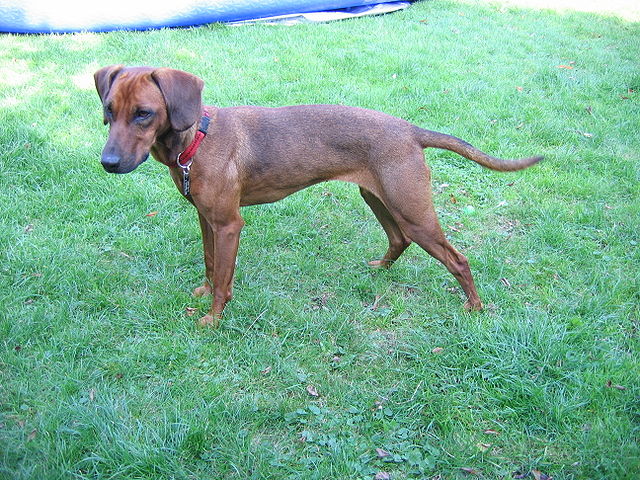The Tyrolean Hound has been used for hunting hare and fox, as well as for tracking injured game even in snow. Created in Tyrol, Austria in the mid 1800’s, this is an enthusiastic hunter known for their hardworking efforts in varied terrain. They are more likely to hunt alone rather than in packs, and will work in both hot and color weather with ease. Intelligent yet independent, this is a typical scenthound descended in part from the German Hound and various Celtic hound breeds. Even the Emperor of Rome, Emperor Maximilian the first, was said to have hunted with this breed of hound! Although rare in the United States, they are recognized by the UKC.
Tyroleans are an active breed and need a home with a yard, or at least somewhere with access to a fenced area every day. Probably not a great match for apartments or even small homes. Very lively and excitable, they were bred to have lots of stamina and therefore need plenty of exercise. If they are granted this exercise they can be calm and easy to keep in the home. They enjoy social outings with their owners, and although they may be cautious and reserved around strangers, appreciate all chances to stretch their legs! They do best living on acreage in the country (when possible), and especially thrive when matched with owners that hunt.
The Tyrolean Hound is affectionate and can make a wonderful pet in the right situation, even doing well in households with children. He loves spending time with his human family and often revels in showing off his silly personalty when offered a game or a toy. Prospective owners must realize that this hound can be mischievous and prone to getting himself into trouble, particularly if he isn’t kept mentally engaged. He needs training, games and other enriching mental activities to keep him busy and happy. Without these mental outlets he can become a serious digger, destructive chewer, and continuous howler!
The Tyrolean can be trained in obedience although can be stubborn and therefore requires patience on the part of the owner! This independent hound may question the commands given to him if he feels there is a better way to accomplish a task, and his intelligence sometimes makes him difficult to work with. This is not to say that he can’t become a wonderful worker, but it will likely require some firmness on the part of the owner/trainer. Making sure to engage the dog with positive reinforcement will definitely help, and it is always recommended to start lessons early in puppyhood! When trained by an experienced owner, this can be a wonderfully working dog.
Tyrolean Hounds do not make good guard dogs as they are far too docile for such a task, however their loud bark can serve as an excellent deterrent to would-be intruders. Their courage is saved for the quarry which they hunt, rather than humans. While they are inclined to ignore strangers until they get to know them, they are affectionate and loyal to those whom they know and consider their family.
The Tyrolean is a rather small breed, standing at 16 and a half inches (for small females) up to 19 and a half for a taller male. They are muscular, yet lean and sinewy. Their body is rectangular, with a deep chest and pronounced withers. The high-set tail is long and should reach to the hock joint, carried high in a sabre fashion when moving or excited. On the head, the hanging ears are wide and rounded at the ends. The double coat is short yet coarse all over (requiring a good brushing once a week) and three colors are acceptable for the breed, including red, black/tan or tricolor.
The average lifespan of the Tyrolean Hound is 13-14 and most individuals are very healthy. Like all purebreds (and mixed breeds) however, there is always the possibility for health issues to occur. Hip dysplasia and ear infections are two of the more commonly-seen problems in this scenthound. Choosing a reputable breeder that health tests can help lower the chances of the former health issue, and cleaning ears on a weekly basis will help with the latter issue.

Photo By Fotting
